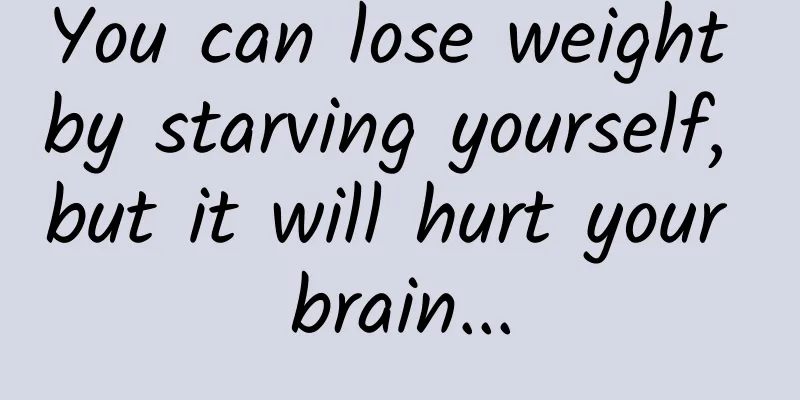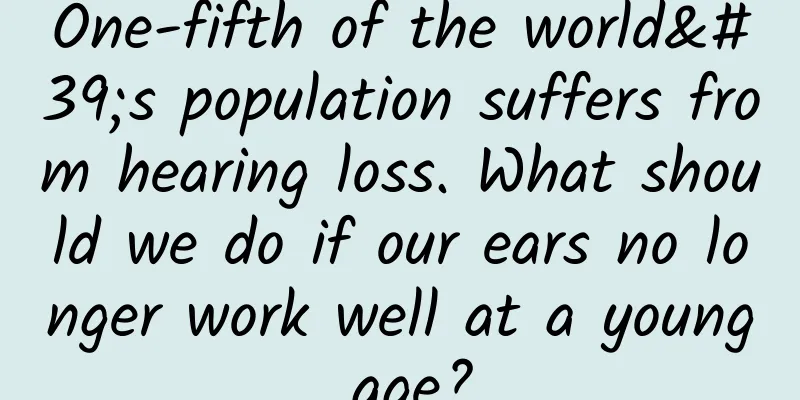You can lose weight by starving yourself, but it will hurt your brain...

|
I ate and drank to my heart's content for a week during the Chinese New Year, and as soon as I got back to work, I filled the next few weeks with delicious food to calm my depressed mood caused by "holiday syndrome." It's over. The temperature is rising soon, which means spring is approaching. What should I do? I'm still running on the road of gaining weight... Next, there will be a large number of new annual weight loss plans on pyq, and the soul running through them must be the word "hunger". Many people eat less at noon and do not eat at night, hoping to achieve the effect of weight loss. But can “starving” really help you lose weight? How fat is produced Fat is not just the fat visible to the naked eye. There are also many lipid molecules distributed throughout the body, such as triglycerides and cholesterol esters that are commonly seen on physical examination reports. The content of these lipid molecules can reflect the health of the body to a certain extent. Generally speaking, if the content is too high, you should pay attention to your fat intake. Where does this fat come from? The food we eat is broken down into small molecules such as monosaccharides, amino acids, glycerol, and fatty acids under the action of various digestive enzymes. Among them, glycerol, fatty acids and other substances can be resynthesized into fat molecules after being absorbed by the human body and transported to various tissues for storage. Generally speaking, a large number of fat molecules are stored in the body's fat cells. Paraffin section of adipose tissue, image source: Wikipedia Normally, the number of fat cells remains stable after puberty and does not change easily, but their size is not fixed. As fat reserves increase, fat cells will become larger. How the human body burns itself We know that fat is related to the human body's energy metabolism, so what is energy metabolism? For the body, sugar, fat and protein can all be used to provide energy, which involves the human body's two major energy supply systems - the glycolysis system and the aerobic metabolism system. When a person is in a resting state or in a state of medium to low intensity exercise, the body mainly relies on aerobic respiration to burn glucose for energy. When the intensity of exercise increases, the glycolysis system starts to work, converting glucose into lactic acid under anaerobic conditions and releasing energy to support body movement. So when you do strenuous exercise, you will feel muscle soreness. Sprinting - intense exercise (anaerobic exercise), image source: hippopx When you're hungry, things are different. How the human body responds to hunger When you start to feel hungry, your blood sugar level will be lower than usual. The brain receives the signal of low blood sugar and sends a signal of "I want to eat something". At the same time, it instructs the body's glycogen and other substances to break down into glucose, appropriately increasing the blood sugar content to maintain the normal functioning of the body. If you choose to fight your instinct and resist eating, after more than ten hours, the glycogen will be almost consumed. In order to stabilize blood sugar, the brain will come up with another idea: break down some muscles first, since there is plenty of muscle anyway. Breaking down muscles produces a substance called ketone bodies, which can provide energy for the body. However, at this time, the body has begun to feel uncomfortable, blood sugar has dropped significantly, and the brain has become sluggish. If you continue to insist, after about 72 hours of fasting, the battle against instinct reaches a white-hot stage. At this time, in order to maintain the body's basal metabolism, the brain begins to think of other proteins besides muscle. This is a solution that is like drinking poison to quench thirst. We all know that protein is the material basis of life. If the protein that should have taken on more important tasks is used to provide energy, the normal functioning of the body cannot be maintained. For example, if the immunoglobulins that make up the immune system cannot be synthesized normally, the body's immune function may stop working. At this point, people with poor physical fitness are likely to be in danger of death. Well, if you can still hold on, then we have finally reached the stage where fat is mainly consumed (there will also be a small amount of fat consumption in the previous stage). But the brain has issued a serious warning: "I am about to die, please eat something quickly." You should know that when the body consumes energy, it will follow the order of carbohydrates, proteins, and fats. If you want to starve fat, the first thing to suffer is the important protein. Now, you know why it is unreliable to lose weight by starving yourself. Starving yourself will make you look good, but starving yourself will also cause problems In fact, relying on "starvation" to lose weight is not only difficult to achieve the goal, but will also cause damage to many organs of the body, among which the most obvious victims are the liver, brain and muscle tissue. Let’s talk about the liver first. After being hungry for a long time, the fatty acid molecules in the blood will increase greatly and enter the liver for metabolism. However, the liver lacks sufficient nutrients and cannot produce enough enzymes to cope with the sudden increase in workload. Eventually, fat accumulates in the liver, causing fatty liver. When you are hungry, the brain's energy supply gradually becomes unavailable. You know, the brain is a big energy consumer in the human body and is very sensitive to energy shortages. If it does not get enough energy, nerve cells will start to strike, leading to cognitive decline, the most obvious manifestation of which is a slower response to external stimuli. If you fast for a long time, it will cause irreversible damage. Long-term fasting will cause the body to break down a large amount of muscle (protein), resulting in a significant decrease in muscle content, but fat still stubbornly occupies the body. Moreover, after the fast ends, most people will have a so-called "cheat meal" to reward themselves. However, they do not realize that this practice can easily lead to the bad habit of overeating, which is harmful to health. After reading this, many friends may feel a little discouraged. Doesn’t this mean that there is no way to lose weight? In fact, it is not so. With healthy eating habits and moderate exercise, it is not difficult to lose weight as long as you persist. The weight loss season is here, and Tadpole will slowly teach you some weight loss tips. By the way, how much weight have you gained since the Chinese New Year? END Reviewer: Wang Guoyi, Postdoctoral Fellow in Food Safety. Tadpole Musical Notation original article, please indicate the source when reprinting Editor/Heart and Paper |
<<: Anatomy atlas hidden in Chinese characters
>>: Can silver bracelets cause lead poisoning and make children stupid?
Recommend
Don’t understand UI text design specifications? This article will help you figure it out!
In UI design, text setting is an essential part. ...
A star has fallen! Remembering Academician Huang Xuhua: He lived in anonymity for 30 years and worked hard for national defense
Today (7th) China Shipbuilding 719 Institute issu...
How to plan an event? Four ways to plan an event!
Last week, a friend asked me why I didn’t share s...
AppStore has a loophole and user privacy has been leaked on a large scale
A vulnerability appeared in the AppStore, causing...
Mr. Yuefeng's 20190227 Lecture on the Trend Theory of Speculation Principles - Trend Judgment and Classification and Type 4 Video
Mr. Yuefeng's 20190227 Lecture on the Trend T...
Luckin Coffee-Tips for activating new users!
Aha Moments There are many ways to attract new us...
Sony's failure in China: Do you really think you have the "Great Law"?
Yesterday, the news of Sony Mobile's massive ...
Metaverse Marketing Guide
Here are all the facts you need to know about the...
In addition to the red umbrellas and white stems, have you ever seen these poisonous mushrooms?
Recently, it was reported that a grandmother, mot...
The year's "biggest full moon", "super moon" and "blue moon" appear at the same time. How often does such a "special" astronomical phenomenon occur?
I don’t know if you have noticed that this August...
Where to open the Kuaishou shopping cart?
This article mainly introduces the relevant infor...
Tips for Baidu Mini Program inclusion and experience sharing on developing Baidu Mini Program!
I am very happy to share with you the problems we...
Starting from the account name, we will teach you how to operate a profitable Xiaohongshu account step by step
: : : : : : : : : : : : : : : : : : : : : : : : : ...
What is the main function of Apple Pay?
After nearly two years of release and various twi...
We have summarized ten changes for you to understand in iOS 10 beta 4
On the morning of August 2, Apple released the fo...









